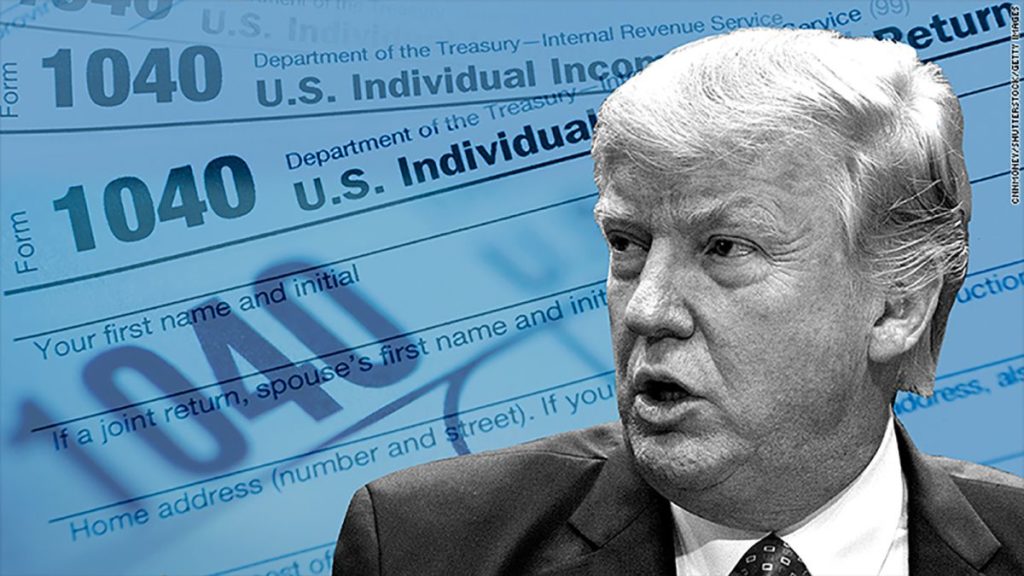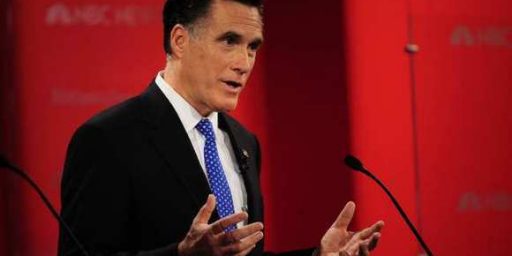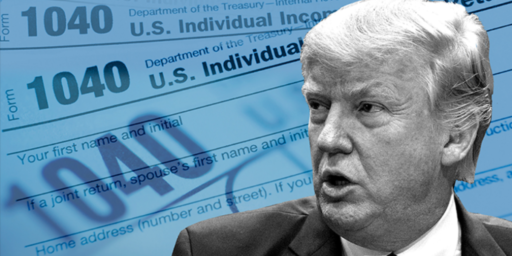What Trump Taxes Show: Not Much
His businesses make and lose a lot of money.

I have written two posts arguing that the prospective and actual release of former President Trump’s tax returns by House Democrats, who had obtained them by subpoena, was an abuse of power with no legitimate legislative purpose. It seemed pretty clearly to be a purely politically-motivated act. Based on the early reporting, it’s not obvious to me what the political purpose was, either.
NYT (“Trump Paid $1.1 Million in Taxes During Presidency, but $0 in 2020, Report Shows“):
In his first three years as president, Donald J. Trump paid $1.1 million in federal income taxes before paying no tax as his income dwindled and losses once again mounted in 2020, according to tax data released Tuesday by a House committee.
The data, which includes details of Mr. Trump’s federal tax returns from 2015 through his full term in the White House, shows that he began his presidency suffering the sort of large business losses that had defined much of his career and paid almost nothing in income tax. But his fortunes changed in 2018, as he reported $24.3 million in adjusted gross income and paid nearly $1 million in federal tax.
Mr. Trump’s tax returns show that he was in the black the following year as well, reporting $4.4 million in income and paying $133,445 in tax. But in 2020, as the country staggered under the coronavirus pandemic, his finances reversed course: Mr. Trump reported a loss of $4.8 million and zero income tax.
[…]
His reports to the I.R.S. portrayed a businessman who took in hundreds of millions of dollars a year, yet racked up chronic losses that he aggressively employed to avoid paying taxes. But while the personal income tax data analyzed by The Times ran only through his first year in the White House, 2017, the information released Tuesday encompasses his entire presidency.
As previously reported by The Times, Mr. Trump paid just $750 in federal income tax and reported $12.9 million in losses in his first year as president, in keeping with a long pattern of reporting losses and paying little or no taxes. The newly released data shows that in 2018, his sudden burst of income occurred largely because he had sold properties or investments at a gain of $22 million. He also appears to have exhausted business losses he had been rolling over year after year to reduce his taxable income. The precise source of the income gain is not clear from the reports.
By 2020, however, Mr. Trump had returned to reporting losses. In fact, despite the capital gains that boosted his bottom line in 2018, the entirety of his core businesses — mostly real estate, golf courses and hotels — continued to report losses every year, totaling $60 million during his presidency. He was able to recoup $5.47 million because he had made millions of dollars in estimated tax payments that he ended up not owing.
Presumably, this reinforces the idea that Trump is actually a pretty lousy businessman. But it looks to be more of what we already understood: the profits from parts of Trump’s business empire are, in most years, offset by losses in other parts.
Now, maybe there’s something here:
Tuesday’s report also raises questions about some of Mr. Trump’s business practices, and the committee has requested that the I.R.S. investigate some of them further. Among them are his charitable contributions.
The tax records previously obtained by The Times show that Mr. Trump made significant charitable donations over the years, but that the vast majority of them came in the form of land donations, often after he had exhausted efforts to develop it.
The new tax data showed that while in the White House, Mr. Trump made charitable contributions in cash, something the House committee said warrants further investigation.
“We would have inquired as to whether the large cash contributions were supported by required substantiation,” the report said.
Given that the IRS is supposed to automatically audit the President’s tax returns and didn’t do so, it’s very much a red flag. But the Ways and Means Committee presumably has access to top-notch accountants and tax attorneys and didn’t actually find any wrong doing—just something they think warrants further investigation.
This is more interesting:
The Times’s findings were cited several times in the report, and helped shape the direction of the committee’s investigation.
For instance, Mr. Trump owns an estate in Westchester County, N.Y., called Seven Springs. For years it was classified as a personal residence. The tax records obtained in 2020 by The Times showed that in 2014, Mr. Trump reclassified the estate as an investment property.
Since then, he has written off $2.2 million in property taxes as a business expense — even as the law allows individuals to write off only $10,000 in property taxes a year.
On Tuesday, the committee revealed that the I.R.S. was looking at this tax maneuver.
But here’s the thing: the reclassification happened in 2014—three years before Trump became President. Presumably, his accountants believed this maneuver was one they could get away with and, indeed, they did.
Do I think Trump and his accountants constantly push the envelope to diminish his tax liabilities? Of course. Hell, he bragged about that during nationally televised Presidential debates. But our tax code practically invites creative accounting, particularly for large business networks.
Beyond that, this strikes me as a weird fishing expedition. The Committee subpoenaed the returns for the perfectly legitimate legislative purpose of investigating strongly suspected malfeasance while Trump was in office. Now they’re trying to get the IRS to audit his business practices from years before.
Again, maybe that should be the norm. Those who hold offices of high public trust should be held to very high standards of personal ethics, especially in terms of doing their civic duty and paying taxes. But, if we’re going to do that with Trump, we should do that with all high officials, certainly to include Members of Congress.
The reports also showed that Mr. Trump continued to collect large sums of interest income, a total of $38.1 million during his presidency. They do not disclose the source of that income, but the tax returns previously obtained by The Times showed that through 2017 nearly all of his interest income came from his share of profits earned by a partnership that is controlled by Vornado Realty Trust.
The partnership owns two valuable office towers: 1290 Sixth Avenue in Manhattan; and 555 California Street in San Francisco. Mr. Trump, who has a 30 percent share in the partnership, has no authority over its management, and it has consistently been his strongest-performing asset.
And?
To be clear, the early reporting is based on the Committee’s summaries of their findings. Maybe there’s more to be found when the redacted documents themselves are released. One presumes that the press corps will pore over them for weeks and months.
It seems that, if Congress is going to take the unprecedented step of releasing a former President’s tax records, doing so should add major information to the public debate. Thus far, it’s not at all obvious what that might be.





Agreed. And I also agree that to this point, it is highly unclear that this is the case.
Since then, he has written off $2.2 million in property taxes as a business expense — even as the law allows individuals to write off only $10,000 in property taxes a year.
What they show is shoddiness and the expectation that you can get away with anything without even having to try. We’re fed the myth that wealthy people have super-complicated tax schemes that none of us can penetrate with our normie minds, and maybe that’s the case with some. I don’t know. But I can tell the difference between 10k and 2.2 million, and there’s no creative gray area obscuring this difference. You don’t need 10K/hour white shoe law firms to do this stuff. You can turn in your returns with ketchup stains on them and the IRS will go with it, because you’re rich.
@Modulo Myself: We changed the law—under Trump’s signature, no less—to cap SALT tax deductions because they tend to mostly exceed said cap in places that vote Democrat. The cap doesn’t apply, though, to business losses. So, the question is whether the reclassification in 2014—well before the change in the SALT cap, by the way—from “personal” to “business” was legitimate. My strong suspicion is that it was hanky-panky; whether it was technically legal, however, is well outside my expertise.
There are two points:
1) Trump is not a billionaire. His income is so low that if he had even a single billion he’d do better putting it all in T-bills or even a savings account. If he’s got a billion somewhere he’s a moron.
2) Over the course of six years Trump paid less federal tax than I did just for 2021. He’s not ‘smart,’ he’s a crook.
It’s worth it just to strip the ‘billionaire’ label off this two-bit huckster, and even Republican voters bridle a bit at tax evaders.
When there’s nothing to hide, one cannot help but wonder why the Cheeto tried so hard and so long to hide it.
We know there is nothing in the tax returns, because if there were, it would have been leaked by now.
All we are seeing is an active businessman. You take profits from one business and start new or support other businesses that, like all businesses, tend to run at a loss for the first few years.
In recent years, it was common to read how this social media or tech company wasn’t making a profit, but that was a good thing as they expanded, but they used stock dilution to keep going. That’s all going to change in the next few years of recession just as it did in 2000 when the tech bubble burst.
@Kathy:
That’s exactly the question I want answered.
@JKB:
Your tin god is a common millionaire – not a billionaire – and an astoundingly bad businessman if we believe his income tax returns. Not to mention a tax cheat.
Further, the proof that there is something fishy in Trump’s tax returns is the fact that Mnuchin refused to perform the legally mandated audits.
Endless 5th amendment pleas, endless fights to stop subpoenas, endless refusal to co-operate with any investigation, six years of lies about some mystery audit. If this was Biden your head would explode with outrage. But your ass belongs to Trump, so you lie – just like your cult leader – and you apply completely different standards which is to say that you have no standards. You’re just a toady, dude, a toady. Your contribution to these pages is to show up periodically to remind us that you got nothing.
Insanely premature conclusion, James. Tax returns are rarely smoking guns. They open up areas to explore. Summaries are almost certainly not going to blatantly expose malfeasance without the painstaking, detailed work required to validate the claims.
Well, duh. They haven’t had the returns long enough to actually investigate. Further investigation is always required.
By releasing them – and I’m not sure I agree with the decision but the inability of the GOP to retaliate because other candidates already release their returns is kinda funny – they are crowd-sourcing that investigation.
Actually, the stated legislative purpose was to evaluate the effectiveness of the policy requirement for mandatory audits of Presidential tax filings. On that score, they exposed that that mandate was being ignored because of the complexity of the returns.
It does. Trump’s tax records are ipso facto major information. Because Trump took the unprecedented step of holding the office of the presidency while hiding his tax records and finances and repeatedly lying about them.
@JKB:
We’re seeing a con artist who has been proven, yet again, that Republican voters sellout American democracy to pathological liars.
“ Given that the IRS is supposed to automatically audit the President’s tax returns and didn’t do so, it’s very much a red flag.”
Who does the IRS answer to? Anyone in the executive branch? If so, this is more than a red flag.
You know, the issue isn’t even that Benito chose not to release his returns, but that he wouldn’t take responsibility for withholding them.
There is no law, nor a requirement that he release them. It’s wholly voluntary, whether every other candidate going back decades has done so or not. Lying about it wasn’t necessary, nor was persisting with the lie after the IRS stated the Cheeto could release any and all of his returns even if some were being audited.
But then we know he’s congenitally incapable of taking any sort of responsibility.
@JKB:
Both you and James seem to have a hard time distinguishing between personal income taxes and corporate income taxes. The whole purpose of incorporating is to insulate the personal from the corporate. Warren Buffet does not have massive fluctuations in his annual income, and he certainly doesn’t have years of essentially zero personal income.
As Michael notes above, wealth generates income. It’s inevitable. If Trump had any personal wealth, he’d have personal income.
@DrDaveT:
If Trump had even a single billion he could have bought annuities FFS and brought in 40 million a year. I mean, I thought I was bad with money. Meanwhile, that other financial whiz kid, Elon, has lost half the value of his company. It’s enough to make me doubt that these are truly gods among men.
@DrDaveT:
I don’t know if this is a thing in America. In Mexico, some companies are associations of persons, not formally incorporated as a corporation with shares and officers. One time our company, a formal corporation, partnered with one of these for a proposal.
The whole structure is different, and so is the income and taxes. Tax returns are a common requirement in proposals submitted to the government. Ours is one return in the name of the corporation. Theirs consisted of several returns, one each per partner.
I don’t know how income is managed or taxed in such a situation, or whether there’s an association income and a personal income or not. I didn’t ask (I didn’t want to pry), and we had tons of work to do (it was one of those assembled over a long, long, long working weekend).
@Kathy: There are various forms of partnerships in the US as well — Limited Liability Corporations (LLC), LL partnerships, etc. Common for law firms, accounting firms, some medical practices, etc. None of those apply to Trump, as best I can tell. And the tax code makes sharp distinctions between what is income to the company/partnership/etc. and what is income to the individual.